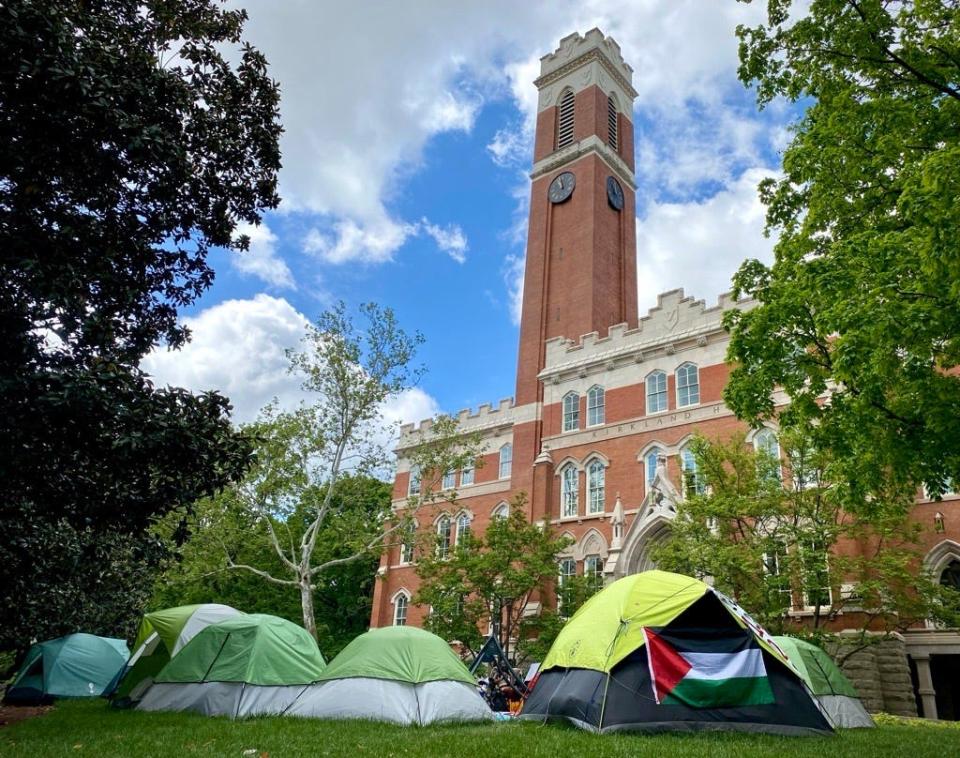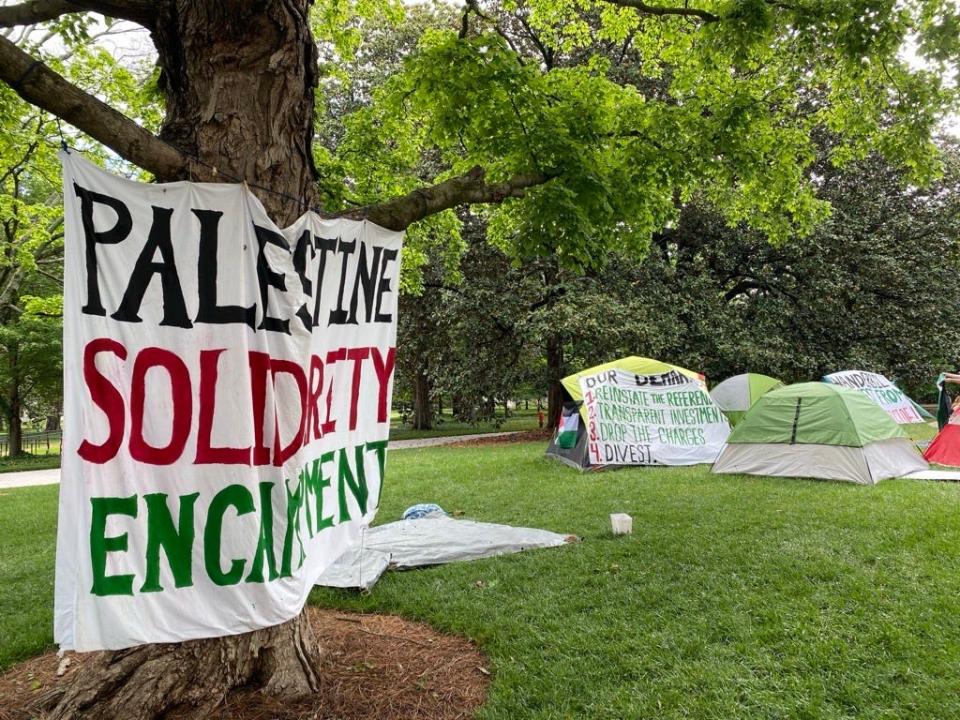Vanderbilt University students have been protesting for one month: What to know
The past weekend marked one month since student demonstrations began on Vanderbilt University’s campus to demand the restoration of a blocked student vote that would have prevented student government funds from going to certain businesses that support Israel.
After a March 26 sit-in of the Chancellor Daniel Diermeier’s office that resulted in the arrest of four students, the expelling of three and the disciplinary action of many more, students have continued to protest by camping in the lawn in front of administrative building Kirkland Hall.

The encampment, named the “Palestine Solidarity Encampment,” mirrors ongoing demonstrations across the country at universities as officials clash with students over free speech issues surrounding the Israel-Hamas war.
What’s happening?
A smattering of nearly a dozen colorful tents — layered in protest banners and Palestinian flags — dotted the administrative lawn in front of Kirkland Hall early Tuesday morning, more than a month after the protests began.
The scene was mostly silent, apart from the toiling of the campus bells as students within the encampment cycled through to take their finals before returning to the site.
The encampment has had an uninterrupted presence on the campus since the beginning of the demonstrations in March, and has even hosted events for non-camping students to get involved with, including a student walkout, 101 educational sessions on the movement and kite painting in honor of those killed in Gaza.
Ezri Tyler, a 20 year-old student protester camping at the private university, was one of the nearly 30 students that entered Deirmeier’s office. She is still on disciplinary probation following the event — a process she called “endless … with no clarification" —but she continues to camp regardless.
“We are breaking the rules, and they have made that very clearly to us over email. They’ve been harassing us almost every day,” she said, adding that as part of her disciplinary punishment she has been told to write a six-page paper on how she broke the university's free speech policies.

University officials told to the Tennessean that there are currently no plans to remove the camping students, as they have not broken any rules.
“Since the March 26 protests there have been a limited number of demonstrations in reaction to the disciplinary action, including a small number of tents on campus," the statement said. "To date, the students have been complying with university policy and have not disrupted university operations.”
How did we get here?
Vanderbilt University students began protesting early on March 26 after an amendment to the Vanderbilt Student Government Constitution, which would have aligned the student government with the principles of the Boycott, Divest and Sanction (BDS) movement, was removed by administration officials from a student ballot in late March.
The BDS principles would have prevented student government funds from going to certain businesses that support Israel.
More: Student sit-in at Vanderbilt over Israel-divestment vote ends Wednesday, students arrested
More than two dozen students entered the halls of Kirkland Hall, which houses the chancellor’s office, to hold a sit-in, along with over 30 more students who sat on the steps outside.
The protest inside lasted about 22 hours, and ended early the following morning with students walked out by Vanderbilt University Police.
Three students who sat in the chancellor's office were arrested for assault and bodily injury to another, while a fourth student was charged with vandalism after breaking a window at Kirkland Hall, according to a statement from Vanderbilt University.
All four students have been released.
The university response to the protests garnered widespread attention from surrounding community, including from Metro Council members, who signed a letter penned by Council member Rollin Horton addressing concerns over the arrest of a local reporter during the demonstrations, and urging the university to embody the free speech principles for which it promotes.
More: Vanderbilt University claims a commitment to free speech. But does it deliver?
Directly following the demonstrations, the university released a statement reaffirming their legal right to "set safety, security, and privacy policies and guidelines" on campus, and to "remove individuals who attempt to violate those policies."
What’s next?
The demonstrations on Vanderbilt's campus come in tandem with intense clashes between police and student protesters on campuses across the country.
Tyler said the students plan to camp for as long as needed to get their message across.
“The long-term goal is university-wide divestment,” she said. “The university is not willing to engage with us, clearly. We’ve not been able to engage with any administrators. We would love to discuss a way forward, but right now a protest is our way of getting our demands through. So we’re standing for university-wide divestment, and we know we’re resolved in camping here until that happens."
Opnion: As a Vanderbilt alum, I am angry, but not surprised, about the recent student expulsions
The Vanderbilt student group is planning a larger demonstration at Centennial Park on Wednesday, May 1, which will be open to the general public.
The USA Today Network - Tennessee's coverage of First Amendment issues is funded through a collaboration between the Freedom Forum and Journalism Funding Partners.
Have a story to tell? Reach Angele Latham by email at alatham@gannett.com, by phone at 931-623-9485, or follow her on Twitter at @angele_latham
This article originally appeared on Nashville Tennessean: Vanderbilt University students have been protesting for one month: What to know

